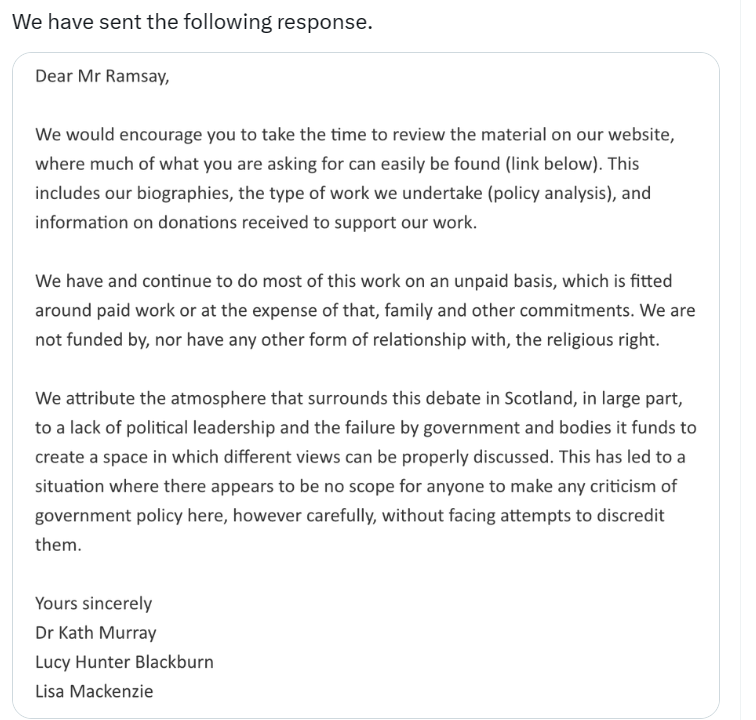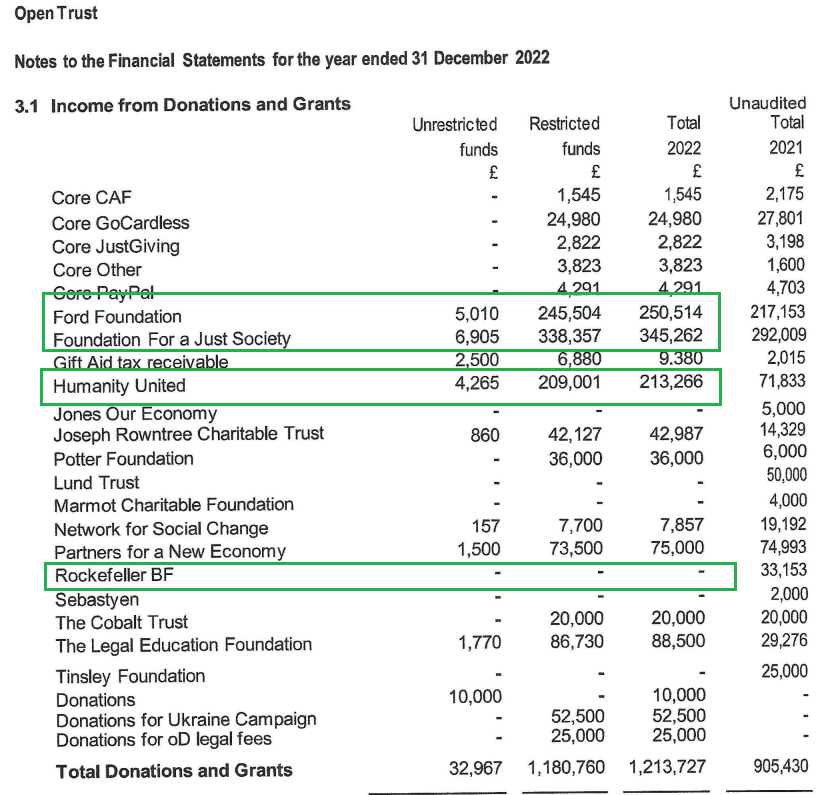I'd be less interested in the funding of Open Democracy if it hadn't behaved like this. 🧵
https://twitter.com/LucyHunterB/status/1708191488545341462
When the article associated with this inquiry finally ran, months later, oddly enough it didn't mention this response at all (and didn't make this sort of mud stick to anyone, albeit not for want of a bit of smearing about). x.com/mbmpolicy/stat…


I had some spare time this evening, so I thought I'd look at OD's funding sources and, out of curiosity, see how easy it is to work out what proportion comes from outside the UK, and specifically, the US.
OD's website says it had £3.44m annual income in 2022. It has over 50 staff, according to its annual report. It's currently recruiting a new editor-in-chief, at a salary of £85-100,000. That ad says it's trebled in size in the last five years. opendemocracy.net/en/supporters/




The list of supporters (in the screenshot upthread) lists various projects over different periods. A lot clearly comes in dollars, but the information on the website spans different periods for each donor, so the amount received in any given year from each source is opaque.
The annual accounts should help. As it happens, they went up on the Companies House site on Friday. OD chooses to take advantage of small company rules, which limit the detail it has to provide. tinyurl.com/yckmpmh4




So the annual income detail formally published for an organisation with a multi-million pound income in 2022 appears to be limited to this. 

But there's a useful reference in the notes to one of its income sources (covering a bit under one-third of the total), the Open Trust, a registered charity which exists in effect to help fund OD. 

The Open Trust has a smaller turnover but submits more detailed accounts. Companies House currently only has these up to 2021, but 2022 ones are available on the Trust's website. The Trust advertises itself as a vehicle for US-based funders. theopentrust.org.uk/governance/


It's possible to cross-refer the Trust's accounts with the list of donors on the OD website, and work out that 67% of the Trust's income is from organisations listed as dollar donors (picked out below in green), which it converts into £s. theopentrust.org.uk/wp-content/upl…


This still leaves the annual income from several $ donors unclear; those highlighted here. Pro rated pa these imply c£1.25m a year. *If* that's how it works, OD is circa 3/5ths funded from US sources, maybe explaining why one of its Directors is a US resident (entirely lawfully).




OD rates the financial transparency of UK-based think tanks. It appears to rate them for the clarity of info on funding *by year*, so its decision to go for the small company account format (and multi-year reporting on its website) is a bit disappointing. opendemocracy.net/en/who-funds-y…
Some of its "A-rated" think tanks list all individuals who give them more than a certain amount. OD does not seem to follow this practice, that I can find.
It does not analyse how far bodies rely on non-UK funding to finance their activity (more "Where funds you?", I suppose).
It does not analyse how far bodies rely on non-UK funding to finance their activity (more "Where funds you?", I suppose).
OD covers stories all round the world; see the map in its annual report here. Clicking on that suggests around 600 stories were published in 2022 about the UK. The next nearest country of interest I found got just over 100. 14 were listed as about the US. cdn2.opendemocracy.net/media/document…
Some of OD's coverage is solid investigative reporting. Some of what it produces is more in the spirit of last summer's letter writing.
As it happens, it generally takes a lot of interest in donors and transparency around donations. tinyurl.com/yc7n8tvr
As it happens, it generally takes a lot of interest in donors and transparency around donations. tinyurl.com/yc7n8tvr
However you look at its output, I think it's fair to describe it as hoping to influence outcomes in UK domestic politics, including on some controversial topics, on which its donors are not without a view.
That being so, being well over half reliant on US funding, while hardly reporting on the US, and reporting on the UK more than anywhere, seems at first sight at least a moderately interesting or relevant feature of OD, as an organisation.
Its very rapid growth in recent years is notable too - in 2016 it had a turnover of only £766k and just 10 employees. Its habit of only producing small company accounts may reflect this. tinyurl.com/3yyr55n7
Perhaps charts in its annual report for the share of income by country source (and its share of coverage by country) would enhance transparency here, as would annualising individual grant info on its website, listing larger individual donors and moving to full UK accounts?
Quis custodiet, and all that.
Ends.
Ends.
Postscript: this from 2007 shows how OD has always been intended to influence policy and law, and not just report, and of course that's OK. But if its focus is heavily on the UK and it's over 50% funded from the US, that's also relevant. opendemocracy.net/en/funding_432…






P.S. 2: this (less obvious) page summarises OD's funding from 2012-21. For 2021 it includes a similar list to what's on its main current funding page, except that one of its largest donors, which is described there in £s, is described here in $s./
opendemocracy.net/en/opendemocra…


opendemocracy.net/en/opendemocra…


The Oak Foundation is HQ'd in Switzerland and has offices in various places, including the UK and US, so where the decision was made to make this large donation/where its financial control lies, and what explains the $ to £ description change, isn't immediately obvious.
The 2021 info also includes this, which clearly provides all individual and trust donors over £5k (the righthand screen shot is the equivalent part of the current funding page). Some of those listed are now included instead among "Foundations and non-profit organisations",/




so it's possible the 2021 individual £5k+ donors who couldn't be reclassified that way (one has been) are no longer donating, although that's left implied rather than being clearly stated, in the absence of an explicit commitment to continue to provide that info.
I feel desperately sad for Umut. If you go back to OD's description of itself years ago, it's a straightforward liberal democracy project. The recent rapid expansion, and the funding and aims that went with that, look worth more attention. x.com/UOzkirimli/sta…
@threadreaderapp please unroll
• • •
Missing some Tweet in this thread? You can try to
force a refresh

 Read on Twitter
Read on Twitter



